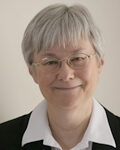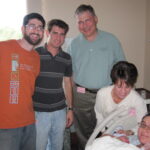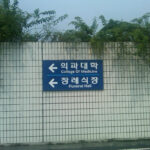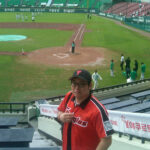Greetings on a glorious Sunday afternoon. Harriet and I just got back from Philadelphia, where we attended the wedding of our oldest son’s best friend dating back to elementary school. It was beautiful. We are about to take a walk into Georgetown for a bite.
Speaking of walks, I am humbled and excited to report that the Lombardi/CBCC Avon Walk for breast cancer team now has 58 members, and has raised more than $44,000 already, placing it solidly in second place among the DC Walk teams. What a difference from 2008, when the team had five walkers, a handful of cheerers and raised less than $10,000. Congratulations to Jeanne Mandelblatt, who is the inspiration and driving force behind the team. Like Lombardi, the team has grown and is having a disproportionate impact for an incredibly important cause. You can contribute or participate as a walker (it’s not too late!) by going to this website. You can also help cheer on the team by contacting Jeanne.
The past week flew by – I left DC on Monday afternoon for a meeting in Chicago, which ended on Wednesday afternoon. I then headed for O’Hare Airport, where my 4 pm plane had been canceled in anticipation of the snowstorm that wasn’t. Fortunately, I was able to get on a 7:30 flight, and landed at about 10:30 to a beautiful starlit night, clear, dry roads and snow that existed only in the imagination. Thursday was not too busy; I judged a few of the posters in the annual Lombardi Research Days competition, and then had an afternoon clinic. I was able to attend the GUMC Town Hall regarding the proposed freeze of staff salaries, and I certainly echo Ken Dretchen’s eloquent sentiments that the work we do could not occur without our dedicated staff, whose interests must be fully considered as all of Georgetown deals with fiscal constraints that have been imposed by external forces.
On Friday, the highlight was the afternoon reception to honor the Lombardi Research Days poster winners, one of whom was Casey Shuptrine from my lab. I certainly had nothing to do with the judging of his poster, but was personally delighted for him and happy to know that others share my high opinion of his project. After that reception I rushed home, put on a tux and headed over to the National Building Museum for the Prevent Cancer Foundation’s annual spring Gala, sponsored this year by the Italian Embassy. Bo Aldige, who also serves on CBCC’s Community Advisory Council and the Ruesch Center’s Advocacy Board, has done a marvelous job with her organization for many years, and it was my pleasure to support its cause, accompanied by Harriet, Joe Teague, Beppe Giaccone, and Waddah Al-Refaie and his wife Thuraya.
Preparations for our CCSG renewal are accelerating, and below I include another installment from the Director’s Overview. We really have accomplished so much as a Cancer Center over the past four years, and it has been very rewarding to actually pull it all together.
Enjoy the coming week, and what may finally be the first glimmers of spring.
Breast Cancer Focused Research
· The First Roadmap for Mathematically Modeling Estrogen Signaling and Cell Fate Is Reported (Clarke [BC]; Tyson, Nat Rev Cancer 2011). Work arising from a multi-investigator program grant (U54CA149147) led by the LCCC Breast Cancer Program involves investigators from Virginia Tech, Fox Chase Cancer Center and George Mason University. This team created the first roadmap presenting preliminary mathematical models of the basic decision circuits for apoptosis, autophagy, and the unfolded protein response and incorporating data on a panel of genes from studies by the LCCC. The overall model now also incorporates key changes in the metabolome and the integration of signaling that regulates UPR, apoptosis, autophagy, and cell fate. Further modifications to the models are expected based on the results of functional genomic studies in this program grant performed by Weiner (ET). Impact: This collaborative effort utilizes mathematical tools to better understand complex signaling networks that influence breast cancer cell fate.
· Key Molecular Features Are Identified That Drive Estrogen-Induced Inhibition Of Breast Cancer Growth (Jordan; Ariazi, Proc Natl Acad Sci USA 2011). Jordan identified that exposure of estrogen to anti-estrogen resistant breast cancer cells surprisingly led to apoptosis and inhibition of tumor growth. Subsequent research supported by a DoD Center of Excellence grant (W81XWH-06 Jordan, PI) has identified ER stress through molecules such as PERK as a contributing mechanism. This work has led to an ongoing translational clinical trial at LCCC and at Fox Chase Cancer Center, evaluating low dose estrogen therapy for endocrine resistant metastatic breast cancer. Impact: This work describes the clinically exploitable mechanisms underlying a novel approach to reversing resistance to anti-estrogens.
· (Sca)-1/ly6A Is a Suppressor of TGFβ Signaling (Glazer [BC], Upadhyay, Proc Natl Acad Sci USA 2011). Downstream signaling initiated by activation of the TGFβ pathway has long been implicated in affecting endocrine responsiveness in breast cancer. NIH R01 (R01CA111482) supported work by Glazer identified (Sca)-1/ly6A as a suppressor of TGFβ signaling. This suppression results in increased expression of the TGFβ ligand GDF10 and the selective activation of TGFβ receptor dependent Smad3 phosphorylation. Impact: This work identifies a novel mechanism for suppressing TGFb signaling in breast cancer development that may lead to new strategies to overcome endocrine unresponsiveness.
· Some Familial Breast Cancers May Be Transmitted Through Heritable Epigenetic Changes (Hilakivi-Clarke (BC); de Assis, Nature Commun 2012). Supported by a U54 (U54CA149147; PI, Clarke, Hilakivi-Clarke) and an R21 award (R21ES013858), Hilakivi-Clarke and colleagues successfully showed that physiologically relevant variations in estrogenicity in utero in one generation altered susceptibility of the mammary gland to carcinogenesis for three subsequent generations in a rat mammary cancer model. These trans-generational effects were maintained by epigenetic modifications. An ongoing study in Swedish women is evaluating whether the gene methylation patterns seen in experimental models are also altered in peripheral DNA from girls whose mothers had high estrogen levels during pregnancy. Impact: This work identifies potential biomarkers of familial breast cancers.
Clinical Research with Translational Implications and Endpoints
· LCCC Leads and Conducts Impactful Clinical Trials. Swain (BC), currently serving as President of ASCO, has led a number of national cooperative group trials in breast cancer (Swain; New Engl J Med 2010; Swain, New Engl J Med 2012; Swain, New Engl J Med 2012). Cheson (ET) serves as Lombardi’s PI for Alliance and the PI for the recently submitted U10 grant and has led that group’s lymphoma committee with distinction for many years [e.g., Br J Haematol 2013, J Clin Onc 2011, Leuk Lymph 2011]. These have been supplemented by many other important investigator-initiated clinical trials, e.g., Hwang, Clin Cancer Res 2010—Phase I study of a small molecule pan-BCL-2 family antagonist in patients with advanced solid tumors or lymphoma, Deeken, Cancer Chemother Pharmacol 2012—Phase I study of liposome-encapsulated docitaxel in patients with advanced solid tumors; Pishvaian, Cancer Chemother Pharmacol 2012—Phase I study of imatinib and paclitaxel in patients with advanced or metastatic refractory solid tumors, Isaacs, Breast Cancer Res Treat 2011—Phase I/II study of sorafenib in hormone receptor positive aromatase inhibitor resistant metastatic breast cancer, Liu, J Clin Oncol 2009—circulating tumor cells predict treatment efficacy in metastatic breast cancer.
· A Novel Rapid Computational Proteo-Chemometric Method Facilitates Screening of Existing Drugs for Anti-Cancer Purposes (Dakshanamurthy [ET], J Med Chem 2012 with Byers [MO]). The “Train, Match, Fit, Streamline” (TMFS) method was used to map new drug-target interactions and predict new uses for existing drugs. Using TMFS, the investigators performed extensive molecular fit computations on 3,671 FDA approved drugs across 2,335 human protein crystal structures to accurately predict drug-target associations. The activity of several identified drugs has been confirmed experimentally. A clinical trial involving mebendozole, one of the identified drugs, is planned (Pishvaian [ET] PI). In collaboration with the High Performance Computing Group at Oak Ridge National Laboratories, through the Georgetown-Howard Universities CTSA, Dakshanamurthy has exported TMFS to the >27,000 clinically active agents available worldwide across all targets in the Protein Data Bank. Impact: This approach to drug repurposing offers new translational opportunities that can be rapidly identified and implemented using currently available drugs.
· Novel Mechanisms of Resistance for Epidermal Growth Factor Receptor-Targeted Therapy Are Identified as Potential Targets (Weiner [ET], Sci Signal 2010). Synthetic lethal screening to identify molecular determinants of resistance to EGFR-targeted therapy by Weiner, Experimental Therapeutics Program member, has led to the identification of molecular targets (e.g., c-abl) whose inhibition enhances the anti-tumor activity and antibody-dependent cellular cytotoxicity promoted by cetuximab. The combination of cetuximab and nilotinib, a c-abl inhibitor, is now being studied in an investigator-initiated clinical trial (Deeken [ET] PI). Impact: This work identifies sensitive nodes in a complex, clinically relevant signaling network that can be attacked.
· Development of a Cancer-Focused Informatics Platform Facilitates Identification of Factors That Impact Outcome (Madhavan [ET], Neoplasia 2011). G-DOC® was developed to provide a mechanism for integrating a variety of clinical and research data types to identify trends and patterns in integrated datasets, supporting the development of patient-specific treatments based on the biology of each patient’s tumor. This resource includes molecular and clinical outcome data for more than 3,600 breast cancer and 1,200 gastrointestinal cancer patients, with substantial peer-reviewed funding. ET members have integrated “multi-omic” data in G-DOC to identify a immune response–related prognostic profile for patients with early-stage colorectal cancer. These intriguing findings have potential to both impact the selection of patients for adjuvant therapy and influence the nature of adjuvant therapy research. Impact: This work has created a foundation for systems based approaches to cancer research at LCCC.





